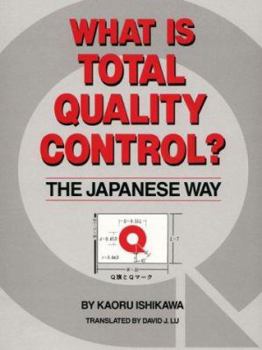What is Total Quality Control? the Japanese Way
Select Format
Select Condition 
Book Overview
This work describes the sort of quality control techniques that have helped Japanese businesses to produce higher-quality goods at much lower cost. It shows how to create quality standards, achieve... This description may be from another edition of this product.
Format:Hardcover
Language:English
ISBN:0139524339
ISBN13:9780139524332
Release Date:January 1985
Publisher:Prentice Hall
Length:215 Pages
Weight:1.52 lbs.
Dimensions:0.9" x 7.3" x 9.6"
Customer Reviews
5 ratings
Great Price & Service
Published by Thriftbooks.com User , 16 years ago
I needed this book for some research. Since it would be substantially marked-up in the process I took a chance on the bargain price offering. What I received was a new book in great condition. The service was great and the condition was better than I had hoped for. I will look for this seller again!
Quality Guru - leading Japanese contributor to quality management.
Published by Thriftbooks.com User , 19 years ago
This was the first book I read on quality a long time ago and stills on my bookshelf. Ishikawa insisted that Total quality means everyone contributes but in teams rather than as an individual, and went on to coin the phrase that quality was a thought revolution and based on the "respect of humanity". Maintaining that building a quality culture was a slow process easily destroyed by too rapid an implementation and that collecting and analysing factual data was the essence of quality control. Like others, Ishikawa believed that quality begins with the customer and therefore the essence of any improvement is based on understanding that customers needs, aspirations and reactions. Clear and distinct clarity was needed in a specification to cover any relevant condition such as humidity, temperature and feel. He also pointed out that customer complaints rather than being a criticism was a vital quality improvement opportunity to be actively sought out. Ishikawa built on Feigenbaum's concept of total quality and suggested that all employees have a greater role to play, arguing that an over-reliance on the quality professional would limit the potential for improvement. Maintaining that a company-wide participation was required from the top management to the front-line staff. As every area of an organisation can affect quality, all areas should study statistical techniques and implement as required with internal and external Quality Audit programmes. Going on to name areas such as engineering, design, manufacturing, sales, materials, clerical, planning, accounting, business and personnel that can not only improve internally but also provide the essential information to allow strategic management decisions to be made concerning the company.
From the alpha to Omega !
Published by Thriftbooks.com User , 20 years ago
Ishikawa makes a careful and intense analysis about the meaning of the Quality Control . Its reading is ver interesting and passionate . It is a fundamental tool for all those managements who really want improve their productivity in their respective work places . A must for you to have it .
The next process is your customer
Published by Thriftbooks.com User , 24 years ago
I select the above phrase as the review's title because it benefits me most. This phrase is very useful in manufacturing firm. If we follow this phrase tightly, we will be able to ensure the products' quality before reach to end-users. Besides that, before implementing QC in Japan, Ishikawa analyzed the differences between QC activities in Japan and Western Countries and concluded it is due to each nation's unique social and cultural background. It gave me a hint that, in order to implement QC in an organization, the information about that organization's social and cultural background must at one's finger tips.
Ask yourself these questions:standards,quality,and fishbone
Published by Thriftbooks.com User , 26 years ago
By reading this book you will learn more about what Kaoru Ishikawa has to say about standards, quality control, and the fishbone diagram. Ask yourself why industry uses standards? The answer is consumers may not be satisfied with a product, and the consumer requirements may change from year to year and that makes industrial standards hard to keep up with consumer requirements. While on the subject of asking questions than ask you what is quality control? According to Kaoru Ishikawa it's a system of production methods, which economically produces quality goods or services meeting the requirements of consumers. The last and final question to ask yourself is what would a fishbone diagram do for me? It would assist you in the identification and listing of all the possible causes that produce problems.





